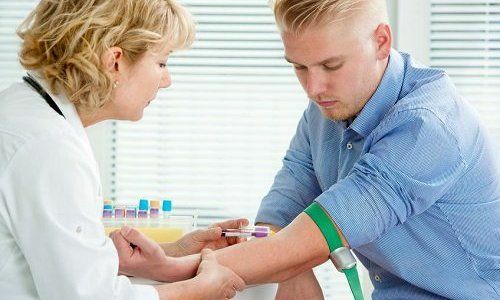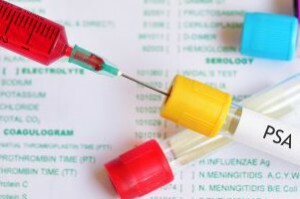The blood test for PSA is very important for men. This antigen indicates the presence of prostate cancer in a man. Prostate is a very delicate organ and the risk of developing cancer cancers in it is high. Identify this pathology is possible only in the laboratory. Self-determination of the nature of the tumor is impossible.

What is an
assay? A prostate specific antigen assay is performed using a patient's blood test. The prostate gland produces a protein substance that is detected in the bloodstream. There are different antigen norms at various ages.
Specialists have identified the relationship between the number of PSA and age. The number of antigens increases by 1 ng / ml every 10 years. In men under the age of 40, the norm is considered to be up to 2.2 ng / ml. Patients over 60 may have a PSA of 4.2 ng / ml. In some cases, a slight deviation of 0.2 ng / ml is possible.
Indicators of analysis may vary depending on the availability of additional factors. There are a number of diseases and processes in the body that cause a temporary increase in PSA.But the main disease, detected at a high rate, is oncology of the prostate gland.
Reasons for increasing the number of antigens
Physicians have identified the relationship between various diseases and the level of PSA in the blood. Indicators can increase in the presence of such pathologies as:
- Benign changes in the prostatic gland;
- Inflammatory processes in the urinary system;
- Bacterial prostate cancer;
- Presence of attendant factors.
 The level of prostatic specific antigen may increase due to the presence of benign changes in the prostate gland. Such pathologies include hyperplasia. With hyperplasia of the prostate, there is a significant proliferation of organ tissues. Especially the process is affected by cells that produce the secret of seminal fluid. These cells begin to actively produce fluid. The body responds to a large amount of liquid as a danger. The response of his reaction is an increase in the production of a prostatic specific antigen.
The level of prostatic specific antigen may increase due to the presence of benign changes in the prostate gland. Such pathologies include hyperplasia. With hyperplasia of the prostate, there is a significant proliferation of organ tissues. Especially the process is affected by cells that produce the secret of seminal fluid. These cells begin to actively produce fluid. The body responds to a large amount of liquid as a danger. The response of his reaction is an increase in the production of a prostatic specific antigen.
The second cause of an increase in the amount of substance in the blood are inflammatory diseases of the genitourinary system. Inflammatory processes can develop in the urinary system for various reasons. This pathology causes a strong edema of the tissues of the ureter and bladder. Puffiness is accompanied by increased blood pressure in the inguinal vein. A protective reaction of the body is an increase in the production of antigens. When the acute form of inflammation is removed, the level of PSA in the blood decreases.
Bacterial infection of the prostate gland is considered one of the common causes of erroneous analysis on PSA.Infection occurs in various ways. In this case, pathogenic microorganisms enter the body. They feed on healthy cells of the prostate tissue. The dead cells accumulate on the affected area. Under them develops the strongest inflammatory process. Prostate tissue becomes edematous and hyperemic. To reduce pathological reactions, the body begins to increase body temperature. An increase in the temperature regime affects the state of the immune defense of a man. The system starts the production of prostatic specific antigens. After reducing the swelling of the prostate, the PSA values are normalized.
Other factors may affect the increase in the Dog in the blood. A prostatic specific hormone reacts to a therapeutic massage of the gland. The level of the substance is normalized a few days after the last session. The antigen also responds to acute inflammation of the urethra. The process is accompanied by a prolonged delay in urination. In this case, the release of the products of the disintegration of urine into the bloodstream occurs. After the normalization of urination, the amount of PSA is reduced. Cystoscopy and biopsy of the prostate gland also affects the increase of antigens in the blood. These tests are carried out in medical laboratories. Doctors are aware of this feature and prescribe a PSA analysis a few weeks after these procedures.
Preparing for the analysis of antigens
Testing is carried out after thorough preparation. Doctors recommend the following rules:
- Sexual rest;
- Refusal of additional procedures on the prostate gland;
- Termination of consumption of alcohol-containing beverages;
- Analysis is performed on an empty stomach.
 Sexual life should be stopped 5-7 days before blood donation for PSA.This is necessary for the accumulation of a secretion of seminal fluid in the prostate. If the organ is healthy, then the release of PSA into the blood will not occur. If the prostate gland is affected by an oncological tumor, then the level of the substance rises.
Sexual life should be stopped 5-7 days before blood donation for PSA.This is necessary for the accumulation of a secretion of seminal fluid in the prostate. If the organ is healthy, then the release of PSA into the blood will not occur. If the prostate gland is affected by an oncological tumor, then the level of the substance rises.
It is necessary to agree additional manipulations with the organ before passing the analysis. Palpation of the prostate gland is permitted two weeks before the examination. Biopsy and cystoscopy is performed 30-40 days before PSA analysis. A variety of mechanical studies are conducted for 10-14 days. All these procedures affect the normal level of the substance. If the rule is not observed, then the PSA content will be high. The analysis must be resubmitted.
Different alcohol-containing beverages have a detrimental effect on the composition of the semen secretion. Its production in the gland is disrupted. If the substance is produced in an uncharacteristic amount, the analysis will not be informative.
It should be noted that the blood from the vein always surrenders on an empty stomach. Doctors do not recommend eating, drinking and various sweets for 6-8 hours before the study. Simple water is also prohibited. After taking the necessary amount of blood, you can eat.
When is the
procedure necessary? A blood test for the amount of PSA is performed when there are various factors. The procedure is carried out in the following situations:
- Detection of the effectiveness of the therapy;
- Presence of remission in a cancer patient;
- Study of health in patients over 45 years of age;
- Determining the nature of the lesion.
Cancer treatment is carried out in a variety of ways. To find out whether the treatment has a positive effect, it is necessary to submit a PSA analysis. If treatment has a positive effect, the level of the substance is reduced.
With proper treatment of oncology, long-term remission can be achieved. Patients whose therapy caused remission should donate blood for the amount of antigen at least 3-4 times a month. If the patient does not do this, the doctor can skip relapse of the oncology of the prostate gland.
In men older than 45 years, it is necessary to carry out a blood test for the presence of antigens at least once a year. This will help to track the change in the amount of the substance in the blood and to prescribe the timely treatment, if necessary.
The main function of the PSA analysis is to identify the nature of the lesion. Cancer cells are determined only with the help of an oncomarker.
The prostate gland is a very sensitive organ. The presence of oncological pathologies in it can determine a blood test for PSA.



